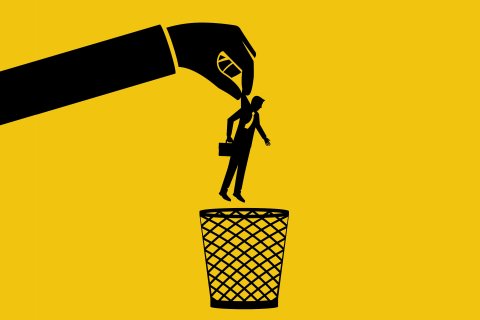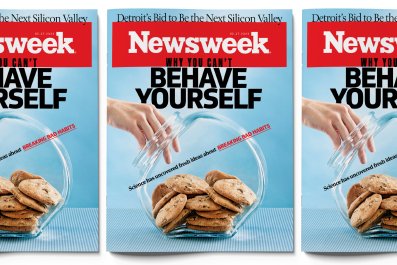- Most Americans are not looking to change job this year, exclusive polling for Newsweek reveals
- Tech companies such as Amazon, Meta and Twitter have announced deep cuts to their workforce following increased hiring in the pandemic
- The threat of recession is fueling anxiety for both workers and businesses
From the Great Resignation of 2021 to the "quiet quitting" trend that redefined the workplace in 2022, the American labor market has had a couple of tumultuous years. But in 2023, on the verge of a potential recession that could have a profound impact on the country's economy, American workers want to stay put—and hold on tight to their jobs.
A broad majority of Americans—64 percent—are not looking to change job this year, according to a recent survey carried out by Redfield & Wilton Strategies on behalf of Newsweek, reversing a steady trend that has characterized the U.S. labor market for the past couple of years.
While these workers—including employed and self-employed individuals—mentioned their current work-life balance as the main reason not to leave their current job, the growing economic uncertainty in the U.S. and the rest of the world is also playing a part in the unwillingness of American workers' to take risks this year and change jobs.
So how bad could the situation get, will people be able to continue working remotely—and does this mean the "quiet quitting" era has come to an end?
Tech Troubles
Mass layoffs in the tech sector, which began in 2022, are continuing this year, with Microsoft announcing earlier this month that it will let go of 10,000 employees in an effort to reduce costs.
"No one can defy gravity and gravity here is inflation-adjusted economic growth," Microsoft CEO Satya Nadella said in a livestreamed discussion at the World Economic Forum (WEF) in Davos last week when announcing the layoffs.
Other major tech companies have made deep cuts to their workforce in recent months, dubbed "loud layoffs", with Amazon announcing plans to lay off 18,000 people and Meta announcing 11,000 job cuts. Under the new Elon Musk ownership, Twitter has laid off half of its workforce.
John Blevins, a guest lecturer at Cornell University's SC Johnson College of Business, told Newsweek that these layoffs are a consequence of increased hiring by tech companies during the pandemic.
"As businesses quickly ramped up to meet the unexpectedly fast demand return, hiring was done hurriedly. Now with an interest-rate-influenced slowing economy, businesses will adjust to slower activity," he said.
"We are still feeling the whiplash effects from stopping the global economy in 2020 and restarting it again in 2021. The technology sector's recent wave of layoffs is an example of this rapid decision making, when services demand spiked and employees were needed quickly. As the tech sector recalibrates, employment levels are being rebalanced to more appropriate levels. This adjustment will continue in many sectors."
But experts say layoffs in the tech sector should not raise too much concern among workers in other industries.
"The U.S. labor market remains strong by most standard job and wage metrics," Gregory DeFreitas, professor of economics and director of the Center for Study of Labor and Democracy at Hofstra University, New York, told Newsweek.
"Though tech layoffs have been grabbing lots of headlines, that mostly looks like copycat short-sighted kneejerk reactions to interest rates and stock prices. Wages have not kept up with inflation for months, but with price increases slowing that could change," he continued.
"The pandemic's impact on essential workers and the tight job market since then have emboldened many to demand better job conditions, benefits, voice at work and union rights. That could well be a long-term change, especially for Gen Z."
Despite being optimistic about the future of the U.S. labor market, Elise Gould, an economist at the Washington-based non-profit the Economic Policy Institute (EPI), told Newsweek she's concerned about workers in the public sector.
"Many public sector jobs simply have not returned [after the pandemic] and have not seen the same kinds of gains [as other sectors]," she said, mentioning jobs in education, and local- and state-level roles. "The private sector has had a much more substantial bounce back in the recovery than the public sector has."

Fears of an Incoming Recession
But while job cuts in the tech sector might not alarm workers at large, the threat of a looming recession appears to be a scary prospect for many.
A total of 57 percent of respondents to Newsweek's poll—conducted on January 16 among a pool of 2,000 people—said they were extremely worried (13 percent), worried (18 percent) or slightly worried (26 percent) about losing their job if a recession were to hit the U.S. Some 43 percent were not worried at all.
Though the U.S. labor market remains tight—a condition that has raised wages at the bottom end of the labor market, shrinking the gap between low-wage workers and those with much higher earnings, and has allowed many low-wage workers to switch to employers with better pay policies—the situation could quickly change in case of a recession.
"The two main threats to the labor market are the Fed, which might tighten too aggressively and weaken employment demand, and Congressional Republicans, who will cause a recession if they successfully use the debt ceiling limit to impose massive spending cuts," Ben Zipperer, another economist at EPI, told Newsweek.
"If the Federal Reserve continues to raise rates too aggressively, then absolutely that can cause a recession," Gould said.
"It can cause a slowdown, it can cause job loss, and the most vulnerable people are most likely to lose their jobs. And so it's a policy decision, as inflation is coming down—has been coming down, if you look at the most recent numbers—and wage growth has been coming down, I think there's less of an urgency and it should be more of a wait-and-see approach to see what becomes of that."
Blevins thinks that "the chances of a recession are high, but early signs show it will likely be mild." This "soft-landing recession," as he called it, "will be cushioned by the fact businesses have replenished cash reserves, skilled workers are still hard to find, and unemployment remains low, despite high interest rates."
A recession would cause a surge in unemployment, according to Blevins, but this "will likely return to normal levels and not the historically low rates we are seeing now."
DeFreitas also thinks that a severe recession can be avoided.
"If the Fed eases up on its tight-money policy, if we get more real pay and benefit improvements and if the latest GDP stats show the positive growth forecast, that could aid consumer spending and help us avoid a serious recession," he said.
"At this point, the main obstacle to that positive path could be U.S. default on its debt thanks to a kamikaze budget policy by the hard-right GOP Congress."
Is It Going to Be Harder to Change Jobs?
Blevins thinks that changing jobs will be harder for the American workers who wish to do so this year, "but primarily due to business apprehension," he said.
"Organizations are feeling less confident about the business outlook, causing hesitation to make human capital investments. Those seeking career changes will experience hiring reluctance, despite conditions being steady at the moment. As markets slow, the difficulty for those looking to move up in their careers via job change will increase."
Blevins said that any job change during a time of adjustment comes with risk, suggesting that workers weigh those risks against the benefit of their higher utilization potential.
"However, many workers will chose safety and not take that risk, which may be a missed opportunity in a limited working career window. The concern of being out of work in a widely anticipated recession will encourage workers to stay put, and that may be exactly what the Fed is hoping for to ease wage growth, a key driver of inflation."
Professor Daniel Cornfield of Vanderbilt University told Newsweek that, in line with our poll's findings, the national rate of quitting—which had virtually doubled from its low of 1.6 in April 2020 through its high of 3.0 in December, 2021—"has hovered between 2.6 and 2.9 through November 2022 (the latest available data), suggesting a slight deceleration in quitting in [late] 2022."
Cornfield thinks that "this may suggest that workers are becoming more risk averse in deciding whether or not to change jobs."
No More 'Quiet Quitting' Then?
Maybe unsurprisingly under the current uncertain economic situation, the phenomenon of "quiet quitting" seems to be in decline.
A broad majority of American workers are happy with their jobs, according to Newsweek's recent poll which found a total of 77 percent of respondents to be "very satisfied" (39 percent) or "satisfied" (38 percent) with their current employment.
The number of "quiet quitters" in the U.S. labor market—which in 2022 was estimated by a Gallup poll to be equal to half of the entire American workforce—seems to have dropped fast, as the economic situation in the country became more dire.
Only 33 percent of respondents to the Newsweek poll said they identified themselves as "quiet quitters"—workers who have actively decided not to put in any more time, effort or enthusiasm into their job than absolutely necessary. A majority of 66 percent didn't recognize themselves in this definition.
Another Reason Why Workers Are Staying Put
An overwhelming 76 percent of respondents to Newsweek's poll said they are happy with their current work-life balance, while 20 percent said they were unhappy with their situation at the moment.
The pandemic almost certainly had something to do with so many workers feeling happier about their work-life balance, as 61 percent said they were happier with their situation now than they were before the COVID-19 outbreak. But the better work-life balance might be due to a surge in the opportunity for working remotely rather than simply working less hours.
Some 45 percent of respondents said they worked just as much during the pandemic as they did before, and 36 percent said they worked even more. Now, 49 percent of respondents said they work just as much now as they did pre-pandemic, while 34 percent said they work harder.
A total of 52 percent of respondents are working remotely either in full or in part, while 48 percent do not work remotely "at all." A majority of respondents to Newsweek's poll found that working remotely made it easier to focus on their own work (49 percent), to avoid stress (51 percent), to eat more healthily (46 percent) and have a social life (35 percent) compared to being in an office setup.











